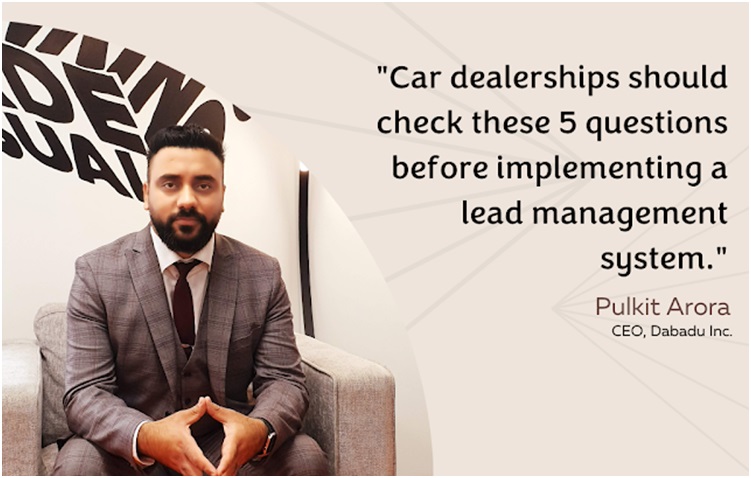Car Dealerships Should Check These 5 Questions Before Implementing a Lead Management System

Toronto: Regardless of their size, car dealerships must embrace incremental changes and adapt to changing times and rising competition. As a car dealer, you will not only have to compete against other dealers that sell new and used cars. However, you will also need to compete against private sellers who may lower your prices. In spite of tight competition in the automotive industry, there are ways to improve the market share of your company in the short and long term. It has been quite apparent for the last two years that the big players in the market, as well as the smaller ones, realized the necessity of investing in and using lead management software in order to secure their potential customers from moving to other dealers.
Consider these five questions when determining if your dealership needs a lead management system:
Question 1: Do you want to engage leads faster?
For a Lead generation, your dealership might be using a variety of methods to reach interested customers, such as email marketing, social media, PPC campaigns, etc. Getting their schedules coordinated can be challenging, though. It is more likely that your sales reps will win over prospects if they contact them sooner. It can be time-consuming to manually assign lead information to each sales rep, delaying the time taken to respond to leads.
With a well-designed lead management system, like Dabadu’s lead intelligence, salespeople across dealerships are automatically assigned leads based on predefined logic.
Question 2: Is your business struggling to identify quality leads?
A dealership’s ability to generate high-quality leads often keeps it in business and allows it to meet its objectives. Maintaining an efficient sales process is critical to prioritize leads with higher conversion possibilities. By assessing the lead’s engagement and interactions with the brand, lead management software enables sales representatives to determine the lead’s level of interest.
Question 3: Do you feel the need to refine your marketing strategy?
Marketing teams can use this tool to redirect their strategy to attract more leads with a higher chance of converting into sales.
Dealerships can make insight-driven decisions regarding their marketing by utilizing lead management software that includes URL tracking and data analysis features. This level of insight allows marketers to determine which of their efforts are most successful and will yield the greatest return on investment.
Question 4: Are you lacking in providing good customer support?
By collecting and analyzing personal data through the platform, lead generation software puts the customer first. It gives the customer support team real-time insights into the client’s interests, credit score, past interactions, and demographics to serve them better.
Question 5: Does your sales team need more effective lead nurturing?
With Lead Management Software, it becomes much easier to nurture leads that are likely to convert. Any car dealership can benefit from such software by better understanding the target audience, which will enable one to have a collaborative discussion.
Revenue and customer retention are increased by nurturing leads and contacting existing customers with personalized messages, and outreach increases revenue and customer retention.
You should ask yourself the following question if any of the above questions pertain to you:
Will any lead management system work for your car dealership?
Probably not. There are different requirements for each business. For car dealerships, lead management software must be tailored just for their needs and must understand and satisfy the company’s needs. Early in 2022, many leading dealerships began switching to a lead management platform designed specifically for the automotive industry and were developed by a Kitchener-based company, Dabadu Inc. According to one of them, Dabadu’s Lead management platform was designed by experts in the automotive market to eliminate all the pain points of the existing platforms. This system helps their dealership organize lead information to understand where prospects are in the sales process and tailor communication to facilitate sales. It allowed them to focus on the leads that would generate business and prevent losing opportunities.